初中英语 牛津上海版九年级上册反义疑问句专项讲解及练习(有答案)
初中英语 牛津上海版8A语法反意疑问句专项讲解及练习(有答案)
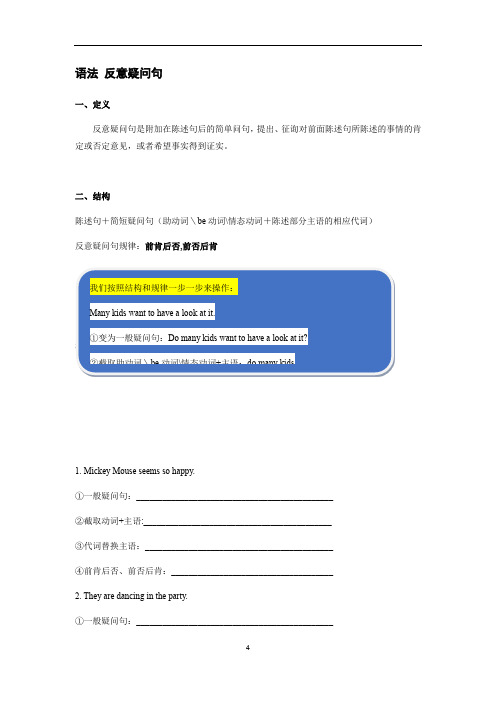
语法 反意疑问句一、定义反意疑问句是附加在陈述句后的简单问句,提出、征询对前面陈述句所陈述的事情的肯定或否定意见,或者希望事实得到证实。
二、结构陈述句+简短疑问句(助动词\be 动词\情态动词+陈述部分主语的相应代词) 反意疑问句规律:前肯后否,前否后肯我们按照刚刚的步骤来试试下面的句子,看看跟原文是不是一致吧1. Mickey Mouse seems so happy.①一般疑问句:_____________________________________________ ②截取动词+主语:___________________________________________ ③代词替换主语:___________________________________________ ④前肯后否、前否后肯:_____________________________________ 2. They are dancing in the party.①一般疑问句:_____________________________________________我们按照结构和规律一步一步来操作: Many kids want to have a look at it.①变为一般疑问句:Do many kids want to have a look at it?②截取助动词\be 动词\情态动词+主语:do many kids②截取动词+主语:___________________________________________③代词替换主语:___________________________________________④前肯后否、前否后肯:_____________________________________3. I can’t enjoy its beauty.①一般疑问句:_____________________________________________②截取动词+主语:___________________________________________③代词替换主语:___________________________________________④前肯后否、前否后肯:_____________________________________4. They are not good citizens (市民).①一般疑问句:_____________________________________________②截取动词+主语:___________________________________________③代词替换主语:___________________________________________④前肯后否、前否后肯:_____________________________________1. Does Mickey Mouse seem so happy?does Mickey Mousedoes hedoesn’t he2. Are they dancing in the party?are they\aren’t they3. Can’t I enjoy its beauty?can’t I\can I4. Aren’t they good citizens?aren’t they\are they三、常用否定词除了上列句子中not表达否定的意义上,常用的一些表达否定意义的词还有:no, never, hardly, seldom, few, little等等。
九年级英语反意疑问句练习题20题(带答案)

九年级英语反意疑问句练习题20题(带答案)1. You like reading books, don't you?答案:是的,我喜欢。
因为这是一个前肯后否的反意疑问句,前面的句子是肯定句,后面的简短问句是否定形式。
根据反意疑问句的规则,当陈述部分是肯定句时,疑问部分要用否定形式,这里前面动词是like,所以疑问部分用don't you。
2. He doesn't go to school on Sunday, does he?答案:是的,他不去。
这是一个前否后肯的反意疑问句,陈述部分是否定句,疑问部分是肯定形式。
由于前面句子中的助动词是doesn't,所以疑问部分为does he。
3. They have been to Paris, haven't they?答案:是的,他们去过。
这是前肯后否的反意疑问句。
前面句子中have是助动词,在疑问部分就要用haven't。
4. She can speak French, can't she?答案:是的,她能。
这是前肯后否的反意疑问句,前面句子中有情态动词can,所以疑问部分为can't she。
5. There is a park near your home, isn't there?答案:是的,有。
这是一个关于there be句型的反意疑问句,前面是肯定的there is形式,所以后面要用否定的isn't there。
6. We won't go to the party tonight, will we?答案:是的,我们不去。
这是前否后肯的反意疑问句,前面句子中的助动词是won't,所以疑问部分是will we。
7. You have a new bike, don't you?答案:是的,我有。
这是前肯后否的反意疑问句,前面句子中have 是实义动词,有,所以疑问部分用助动词do的否定形式don't you。
牛津上海版九年级英语上册Unit5知识点归纳及练习
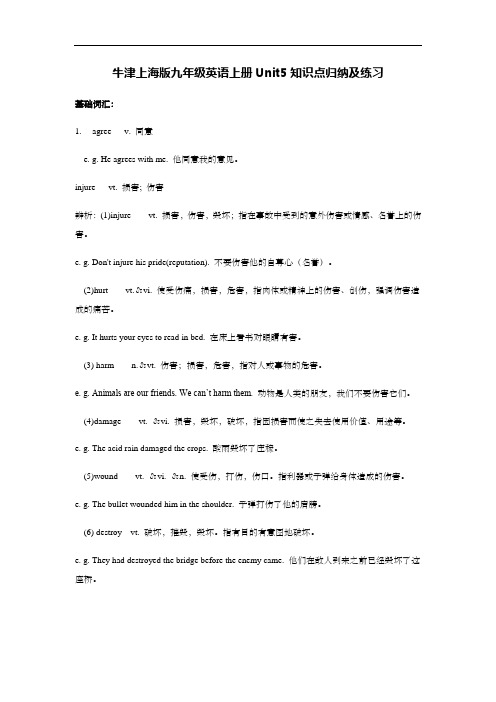
牛津上海版九年级英语上册Unit5知识点归纳及练习基础词汇:1.agree v. 同意e. g. He agrees with me. 他同意我的意见。
injure vt. 损害; 伤害辨析:(1)injure vt. 损害,伤害,毁坏;指在事故中受到的意外伤害或情感、名誉上的伤害。
e. g. Don't injure his pride(reputation). 不要伤害他的自尊心(名誉)。
(2)hurt vt.&vi. 使受伤痛,损害,危害,指肉体或精神上的伤害、创伤,强调伤害造成的痛苦。
e. g. It hurts your eyes to read in bed. 在床上看书对眼睛有害。
(3) harm n.&vt. 伤害;损害,危害,指对人或事物的危害。
e. g. Animals are our friends. We can’t harm them. 动物是人类的朋友,我们不要伤害它们。
(4)damage vt. &vi. 损害,毁坏,破坏,指因损害而使之失去使用价值、用途等。
e. g. The acid rain damaged the crops. 酸雨毁坏了庄稼。
(5)wound vt. &vi. &n. 使受伤,打伤,伤口。
指利器或子弹给身体造成的伤害。
e. g. The bullet wounded him in the shoulder. 子弹打伤了他的肩膀。
(6) destroy vt. 破坏,摧毁,毁坏。
指有目的有意图地破坏。
e. g. They had destroyed the bridge before the enemy came. 他们在敌人到来之前已经毁坏了这座桥。
3. afterward adv. 然后,后来地e. g. We saw the film and afterwards walked home together. 我们看了电影后一起走回了家。
初三英语反义疑问句试题答案及解析
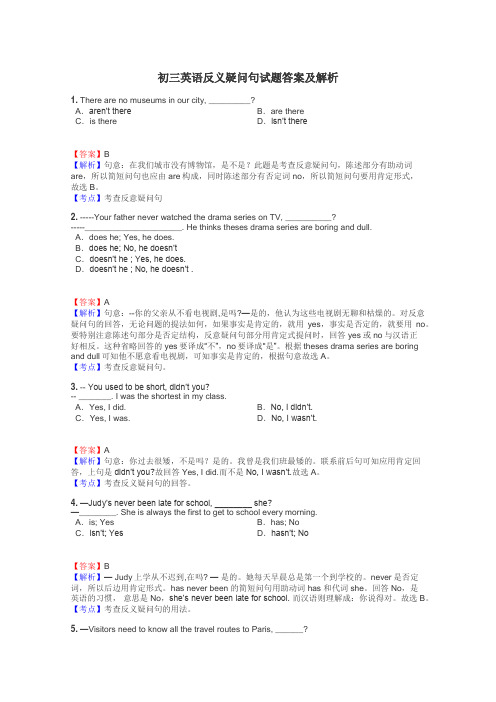
初三英语反义疑问句试题答案及解析1. There are no museums in our city, _________?A.aren’t there B.are thereC.is there D.isn’t there【答案】B【解析】句意:在我们城市没有博物馆,是不是?此题是考查反意疑问句,陈述部分有助动词are,所以简短问句也应由are构成,同时陈述部分有否定词no,所以简短问句要用肯定形式,故选B。
【考点】考查反意疑问句2. -----Your father never watched the drama series on TV, __________?-----_____________________. He thinks theses drama series are boring and dull.A.does he; Yes, he does.B.does he; No, he doesn’tC.doesn’t he ; Yes, he does.D.doesn’t he ; No, he doesn’t .【答案】A【解析】句意:--你的父亲从不看电视剧,是吗?—是的,他认为这些电视剧无聊和枯燥的。
对反意疑问句的回答,无论问题的提法如何,如果事实是肯定的,就用yes,事实是否定的,就要用no。
要特别注意陈述句部分是否定结构,反意疑问句部分用肯定式提问时,回答yes或no与汉语正好相反。
这种省略回答的yes要译成“不”,no要译成“是”。
根据theses drama series are boring and dull可知他不愿意看电视剧,可知事实是肯定的,根据句意故选A。
【考点】考查反意疑问句。
3. -- You used to be short, didn’t you?-- _______. I was the shortest in my class.A.Yes, I did.B.No, I didn’t.C.Yes, I was.D.No, I wasn’t.【答案】A【解析】句意:你过去很矮,不是吗?是的。
初中英语反义疑问句讲解_练习及答案
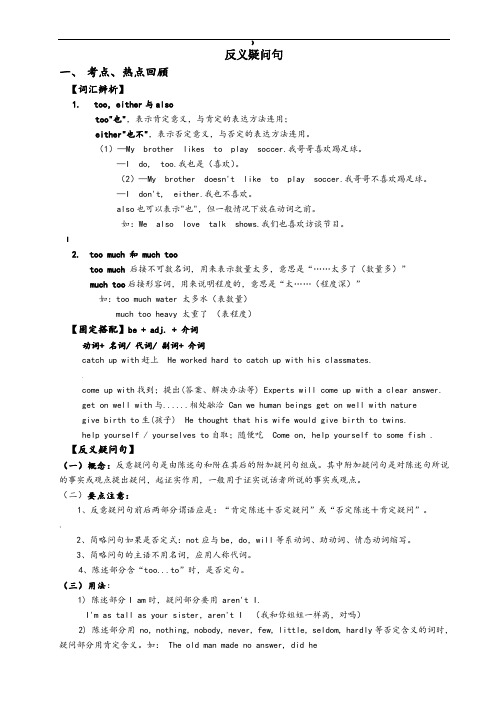
》反义疑问句一、考点、热点回顾【词汇辨析】1.too,either与alsotoo"也",表示肯定意义,与肯定的表达方法连用;either"也不",表示否定意义,与否定的表达方法连用。
(1)—My brother likes to play soccer.我哥哥喜欢踢足球。
—I do, too.我也是(喜欢)。
(2)—My brother doesn't like to play soccer.我哥哥不喜欢踢足球。
—I don't, either.我也不喜欢。
also也可以表示"也",但一般情况下放在动词之前。
如:We also love talk shows.我们也喜欢访谈节目。
|2. too much 和 much tootoo much 后接不可数名词,用来表示数量太多,意思是“……太多了(数量多)”much too后接形容词,用来说明程度的,意思是“太……(程度深)”如:too much water 太多水(表数量)much too heavy 太重了(表程度)【固定搭配】be + adj. + 介词动词+ 名词/ 代词/ 副词+ 介词catch up with赶上 He worked hard to catch up with his classmates..come up with找到;提出(答案、解决办法等) Experts will come up with a clear answer.get on well with与......相处融洽 Can we human beings get on well with naturegive birth to生(孩子) He thought that his wife would give birth to twins.help yourself / yourselves to自取;随便吃Come on, help yourself to some fish .【反义疑问句】(一)概念:反意疑问句是由陈述句和附在其后的附加疑问句组成。
初三英语反意疑问句练习题40题含答案解析

初三英语反意疑问句练习题40题含答案解析1.She is a good student, isn't she?A.is sheB.isn't sheC.does sheD.doesn't she答案解析:B。
反意疑问句遵循“前肯后否,前否后肯”的原则。
前面陈述句是肯定句,后面要用否定形式。
主语是she,be 动词是is,所以反意疑问句是isn't she。
A 选项is she 没有用否定形式;C 选项does she 和D 选项doesn't she 中助动词does 错误,前面句子中有be 动词is,要用be 动词构成反意疑问句。
2.He likes playing basketball, doesn't he?A.does heB.doesn't heC.is heD.isn't he答案解析:B。
前面陈述句是肯定句,后面用否定形式。
主语是he,谓语动词是likes,用助动词does 构成反意疑问句,所以是doesn't he。
A 选项does he 没有用否定形式;C 选项is he 和D 选项isn't he 中be 动词错误,前面句子用助动词does 构成反意疑问句,不能用be 动词。
3.They are happy, aren't they?A.are theyB.aren't theyC.do theyD.don't they答案解析:B。
前面陈述句是肯定句,后面用否定形式。
主语是they,be 动词是are,所以反意疑问句是aren't they。
A 选项are they 没有用否定形式;C 选项do they 和 D 选项don't they 中助动词do 错误,前面句子中有be 动词are,要用be 动词构成反意疑问句。
4.We have a lot of books, don't we?A.do weB.don't weC.have weD.haven't we答案解析:B。
初中英语反义疑问句讲解-练习及答案
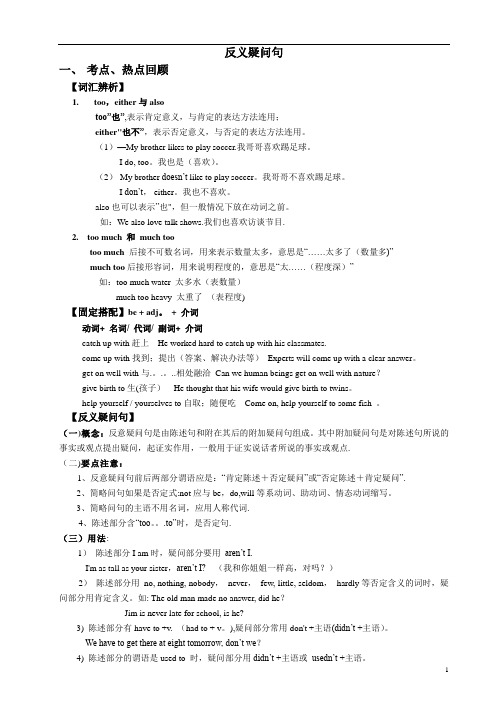
反义疑问句一、考点、热点回顾【词汇辨析】1.too,either与alsotoo”也”,表示肯定意义,与肯定的表达方法连用;either"也不”,表示否定意义,与否定的表达方法连用。
(1)—My brother likes to play soccer.我哥哥喜欢踢足球。
-I do, too。
我也是(喜欢)。
(2)-My brother doesn’t like to play soccer。
我哥哥不喜欢踢足球。
-I don’t, either。
我也不喜欢。
also也可以表示”也",但一般情况下放在动词之前。
如:We also love talk shows.我们也喜欢访谈节目.2. too much 和much tootoo much 后接不可数名词,用来表示数量太多,意思是“……太多了(数量多)”much too后接形容词,用来说明程度的,意思是“太……(程度深)”如:too much water 太多水(表数量)much too heavy 太重了(表程度)【固定搭配】be + adj。
+ 介词动词+ 名词/ 代词/ 副词+ 介词catch up with赶上He worked hard to catch up with his classmates.come up with找到;提出(答案、解决办法等)Experts will come up with a clear answer。
get on well with与.。
.。
..相处融洽Can we human beings get on well with nature?give birth to生(孩子)He thought that his wife would give birth to twins。
help yourself / yourselves to自取;随便吃Come on, help yourself to some fish 。
初中英语语法之反义疑问句详解及强化练习含答案
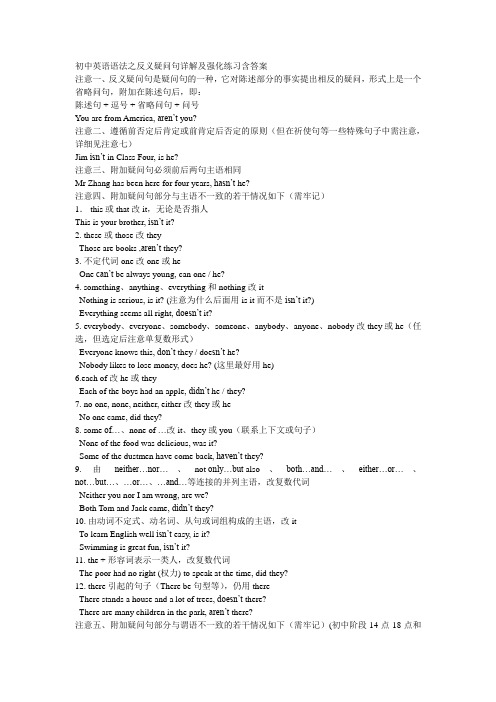
初中英语语法之反义疑问句详解及强化练习含答案注意一、反义疑问句是疑问句的一种,它对陈述部分的事实提出相反的疑问,形式上是一个省略问句,附加在陈述句后,即:陈述句 + 逗号 + 省略问句 + 问号You are from America, aren’t you?注意二、遵循前否定后肯定或前肯定后否定的原则(但在祈使句等一些特殊句子中需注意,详细见注意七)Jim isn’t in Class Four, is he?注意三、附加疑问句必须前后两句主语相同Mr Zhang has been here for four years, hasn’t he?注意四、附加疑问句部分与主语不一致的若干情况如下(需牢记)1. this 或that改it,无论是否指人This is your brother, isn’t it?2. these或those改theyThose are books ,aren’t they?3. 不定代词one改one或heOne can’t be always young, can one / he?4. something、anything、everything和nothing改itNothing is serious, is it? (注意为什么后面用is it而不是isn’t it?)Everything seems all right, doesn’t it?5. everybody、everyone、somebody、someone、anybody、anyone、nobody改they或he(任选,但选定后注意单复数形式)Everyone knows this, don’t they / doe sn’t he?Nobody likes to lose money, does he? (这里最好用he)6.each of改he或theyEach of the boys had an apple, didn’t he / they?7. no one, none, neither, either改they 或heNo one came, did they?8. some of…、none of …改it、they或you(联系上下文或句子)None of the food was delicious, was it?Some of the dustmen have come back, haven’t they?9. 由neither…nor…、not only…but also、both…and…、either…or…、not…but…、…or…、…and…等连接的并列主语,改复数代词Neither you nor I am wrong, are we?Both Tom and Jack came, didn’t they?10. 由动词不定式、动名词、从句或词组构成的主语,改itTo learn English well isn’t easy, is it?Swimming is great fun, isn’t it?11. the + 形容词表示一类人,改复数代词The poor had no right (权力) to speak at the time, did they?12. there 引起的句子(There be句型等),仍用thereThere stands a house and a lot of trees, doesn’t there?There are many children in the park, aren’t there?注意五、附加疑问句部分与谓语不一致的若干情况如下(需牢记)(初中阶段14点18点和19点可以常识性了解)1. have (有)改have或doMary has two brothers, doesn’t she / hasn’t she?2. have (有)必须与陈述部分一致He hasn’t a lot of time, has he?Miss Green doesn’t have any money in her pocket, does she?3. have不做“有”解释,必须用doThey all have a good time, don’t they?4. have to用do或haveWe have to get up early, don’t we / haven’t we?5. have got to用haveWe have got to answer all the questions, haven’t we?6. had better用should或hadWe had better go right now, shouldn’t we / hadn’t we?7. can’t(不可能,表示推测)根据can’t或的动词选择相应的形式He can’t be a doctor, is he?The workers can’t have finished their work, have they?8. may 用may + 主语 + not (英语中不用mayn’t)They may be here next week, may they not?9. must(必须)用needn’tYou must do it today, needn’t you?10. must(应该)用mustn’tI must study hard, mustn’t I?11. mustn’t用must或mayYou mustn’t talk like that, must you?We mustn’t stay here any longer, must we?12. “must be”对现在情况进行推测作一般现在时或现在进行时的附加疑问句进行处理2 反义疑问句He must be happy, isn’t he?He must be working hard at the office, isn’t he?must表示推测时,也有用mustn’t的He must have been working very hard, mustn’t he?You must have told Mr Wang the secret, mustn’t you?13. “must + 完成时”表示对过去情况的推测,作一般过去时附加疑问句处理He must have come yesterday, didn’t he?You must have seen the play last week, didn’t you?14. “must + 完成时”用来推测过去的动作持续到现在按现在完成时的附加疑问句来处理 You must have studied English for years, haven’t you?He must have lived here for at least ten years, hasn’t he?14. 实义动词need和dear用doHe needs help, doesn’t he?I have never dared to ask him, have I?15. 情态动词need和dear用need和dearHe dare not say so, dare he?We need not do it again, need we?16. need n’t用need或mustYou needn’t go yet, need you?He needn’t do that, must he?17. “ would rather + 动词原形”和“would like to + 动词原形”用wouldn’tHe would rather read the text ten times than recite it, wouldn’t he?You’d like to have some bananas, wouldn’t you?18. “ought to + 动词原形”用oughtn’t或shouldn’tThe child ought to be punished, oughtn’t he?We ought to go there, shouldn’t we?19. “used to + 动词原形”用“didn’t + 主语”或“usedn’t + 主语”或“used + 主语 + not”He used to live in London, usedn’t he / didn’t he?He used to play football when he was a child , used he not?注意六、句子中有seldom, hardly, no, not, never, few, little, nothing, nobody, nowhere等是否定句,附加疑问部分必须采用肯定形式Nobody phoned while I was out, did they?He is hardly able to swim, is he?There is little ink in your pen, is there?no one, nobody, none, nothing, neither等作动词的宾语时,附加疑问部分一般采用肯定形式(也偶尔用否定形式)He has nothing to say, does(n’t) he?You got nothing from him, did(n’t) you?注意七、一些特殊句型的附加疑问句1. I am…改aren’t II am your friend, aren’t I?2. I wish to do sth或I wish I …改may II wish to go home, may I?I wish I were you, may I?3. 主从复合句,与主句的主谓语保持一致He says that I did it, doesn’t he?David wouldn’t go there if it rained, would he?4. 并列句,与邻近的分句保持一致Mary is a nice girl, but she had one short-coming, hadn’t she?5. 表示邀请,请求的祈使句,附加疑问部分用will you或won’t you或would you等,一般只要记住will you就可以了,不遵循前否定后肯定或前肯定后否定的原则Come here, will you?Turn off the light, will you?Do sit down, will you?6. 表示告诉别人做某事的祈使句,用will you、can you、would you或can’t you、won’t you Stop talking, can you?Write down the new words, will you / won’t you?7. 否定的祈使句用will you或can youDon’t make a noise, will / can you?8. Let me …用will you 或may ILet me help you, may I?Let me do it, will you?9. Let’s…表示建议包括听话人在内,用shall weLet’s go for a walk, shall we?10. let us …表示允许,不包括听话人在内,用will youLet us do it by ourselves, will you?11. Let接第三人称宾语时用will youLet him come in, will you?12. Let’s not …用OK或all rightLet’s not go to the party, OK / all right?13. 感叹句用一般现在时be的形式(故事中用一般过去时be的形式)What fine weather, isn’t it?How clever the boy is, isn’t he?How hard she works, isn’t she?反意疑问句试题及答案一.完成下列反意疑问句, 一空一词:1.We must go at once, ?2.My uncle used to smoke, ?3.She must be a music lover, ?4.You need to have a good dictionary, ?5.Let us do the jobs ourselves, ?6.There used to be an old stone bridge across the river, ?7.Please turn down the radio, ?8.There were few people there, ?9.If anybody comes here, he will be welcome, ?10.You must have seen her yesterday, ?二、把下列各句改成反意疑问句:11.I think he is right.12.I don’t think you're seriously i ll.13.I don’t suppose they will be back soon.14.Don’t do such a job.15.You needn’t do that when your daughter is here.16.What you need is more practice.17.He says that it is really true.18.He dared to ask the teacher many questions.19.That is an honest girl?20.Tom hasn’t much time to spare.三、将下列句子译成英语(一空一词):21.人无完人, 对吗?, ?22.你每年冬天感冒, 是不是?, ?23.你伯父过去住在宁波, 对不对??24.A:他不想买这辆十速自行车, 对吗?B:对, 他不想买。
- 1、下载文档前请自行甄别文档内容的完整性,平台不提供额外的编辑、内容补充、找答案等附加服务。
- 2、"仅部分预览"的文档,不可在线预览部分如存在完整性等问题,可反馈申请退款(可完整预览的文档不适用该条件!)。
- 3、如文档侵犯您的权益,请联系客服反馈,我们会尽快为您处理(人工客服工作时间:9:00-18:30)。
反义疑问句一、英文中的反意疑问句。
1、什么是反意疑问句英语中,反意疑问句是由陈述句和附在其后的附加疑问句组成。
其中附加疑问句是对陈述句所说的事实或观点提出疑问,起证实作用,一般用于证实说话者所说的事实或观点。
翻译为“是吗”2.反意疑问句的回答,回答时,如果情况属实,用Yes加上反问句的倒装肯定句;若果情况不属实,则用No加上反问句的倒装否定句。
例如You were moved by your students, weren’t you?情况属实:Yes, I was. 情况不属实:No, I wasn’t.二、反意疑问句中问句部分的动词与陈述部分的动词在语气上成相反的对应关系,即:肯定+否定?否定+肯定?如:①They are very late for the meeting, aren’t they? 他们开会迟到了,是吗?She was ill yesterday, isn’t she?②You can’t do it, can you? 你不能做它,是吗?You didn’t go, did you?三.当陈述句中含有be动词,助动词,或是情态动词时,反问句部分由这些词加上主语人称代词构成,Be动词包括:am, is, are, was, were助动词有:do, does, did, have(用在完成时), has(用在完成时)等情态动词有:can, could, may, might, must, will, would, shall, should例如:She is a lovely girl, isn’t she? 她是一个可爱的女孩,是吗?He will go home, won’t he? 他要回家了,是吗?She doesn’t like to eat popcorn, does she? 她不喜欢吃爆米花,是吗?The baby won’t sleep early, will it? 小宝宝睡得不早,是吗?注意:①He has supper at home every day, doesn’t he? (不能用hasn’t he?)他每天在家吃晚饭,是吗?②They have known the matter, haven’t they? (不能用don’t they?)他们已经知道那事情了,是吗?四.当陈述句中只含有行为动词时,若动词加了s,就用does, 若动词为原形,就用do,动词为过去式,则用did,例如:You cleaned your house last week, didn’t you? 你上周打扫了你的房间,是吗?Your father plays the computer very well, doesn’t he? 你父亲电脑技术很好,是吗?They look so happy today, don’t they? 你今天看起来很高兴,是吗?五.反意疑问句的陈述部分带有little, few, never, hardly, seldom,nobody, nothing, barely, scarcely等否定意义的词时,问句部分用肯定式。
如:①She never tells a lie, does she?(不用doesn’t she?) 她从不说谎,是吗?②He was seldom late, was he?(不用wasn’t he?) 他几乎不迟到,是吗?六、反意疑问句的陈述部分为I am……时,问句部分习惯上用aren’t I?表示。
如:I am a very honest man, aren’t I?I am a student, aren’t I?七.陈述部分的主语为不定代词something, anything, nothing, everything时,问句部分的主语用it。
如:①Something is wrong with the computer, isn’t it? 电脑有问题了,是吗?②Nothing has happened to them, has it? 他们什么事也没发生,是吗?八、陈述部分的主语为不定代词somebody (someone), anybody (anyone), nobody (no one), everybody (everyone)时,问句部分的主语用he或they,这时问句动词的数应和he或they一致。
如:Someone has taken the seat, hasn’t he? 有人已经坐了位置,是吗?Everyone has done their best in the game, haven’t they? 每个人在比赛中已经尽力了,是吗?九.陈述部分为祈使句1)若为let’s引导,反问句用shall we? 例如Let’s go home together, shall we? 让我们一起回家,好吗?2)若为let us引导和其余的任何一般的否定祈使句,都用will you,例如Let us stop to rest, will you? 让我们停下休息,好吗?Don’t make any noise, will you? 别弄出噪音,好吗?3)一般的肯定祈使句则用will you 或won’t you 都行,例如:Do sit down, won’t you? / will you? 请坐,好吗?You feed the bird today, will you? 今天你喂鸟,是吗?Please open the window, will you? (won’t you?) 打开窗,好吗?十:陈述部分为There (Here) + be + 主语时,问句部分用动词+there (here)?形式。
There are two cakes on the plate, aren’t there? 碟子里有两块蛋糕,是吗?Here is a story about Mark Twain, isn’t here? 这是关于马克吐温的故事,是吗?十一.当陈述部分有情态动词must,问句有4种情况:(1)mustn't表示“禁止,不可”时,附加问句通常要用must。
如:You mustn't stop your car here, must you? 你不能把车停在这地方,知道吗?(2)must表示“有必要”时,附加问句通常要用needn't.如:They must finish the work today, needn't they? 他们今天要完成这项工作,是吗?(3)当must用来表示对现在的情况进行推测时,问句通常要根据must后面的动词采用相应的形式。
如:He must be good at English, isn't he? 他英语一定学得很好,是吗?(4)当must+ have done表示对过去的情况进行推测(一般句中有明确的过去时间状语),问句要根据陈述部分谓语的情况用“didn't+主语”或“wasn't/weren't+主语”;如果强调动作的完成(一般没有明确的过去时间状语),问句要用“haven't/hasn't+主语”。
She must have read the novel last week, didn't she?她上星期一定读了这本小说,是吗?You must have told her about it, haven't you? 你一定把这事告诉她了,是吗?十二.陈述部分有have to+V(had to + V)疑问部分用don’t +主语或didn’t + 主语如:we have to get there at eight tomorrow, didn’t we?They had to cross the busy street, didn’t they?十三. 当陈述部分是主从复合句时,附加疑问部分一般应与主句的主语和谓语动词保持对应关系。
如:She says that I did it, doesn’t she?They don’t know where she comes from, do they?注意:但当陈述部分的主句是I think, I believe, I suppose, I expect等结构时,附加问句中主谓句一般要与宾语从句的主谓语保持一致,并且要注意否定的转移。
如:I think she is wrong, isn’t she?I don’t think she can make such a beautiful kite, can she?十四. 当陈述部分是并列句,附加疑问句则需和就近的分句的主语和谓语一致。
如:Xiao Ling has been writing letters all afternoon but he should finish them now, shouldn’t he?十五.当陈述部分含有情态动词used to时,疑问部分可用usedn’t 或didn’t。
如:The old man used to smoke, didn’t he ? / usedn’t he ?十五.陈述句子中的主语为动词不定式短语、动名词短语或其他短语时,疑问部分的主语通常用it。
如:Learning how to repair motors takes a long time, doesn’t it?Where to hold the meeting has not been decided, has it?十六. 陈述句中的谓语动词是wish,表示愿望时用may,且用肯定形式。
如:I wish to learn English, may I?十七. 反意疑问句的回答用yes,no,但是,回答意思相反。
当反义疑问句的结构为前面否定,后面肯定时,要注意yes 译为“不”,而no译为“是的”。
如:⑴---They don’t work hard, do they? 他们不太努力工作,是吗?----Yes, they do. 不,他们工作努力。
/No, they don’t. 对,他们工作不努力。
⑵--- She is a student, isn’t she? 她是一名学生,不是吗?---- Yes, she is. 是的,她是。
⑶--- She isn’t a student, is she ? 她不是一名学生,是吗?--- Yes, she is. 不,她是学生。
